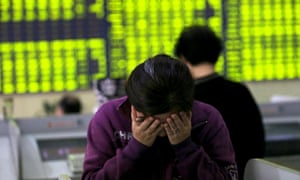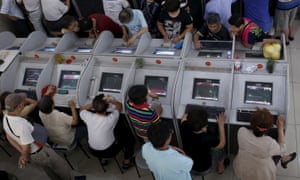Asian markets up as European leaders struggle for Greece deal
Markets in Shanghai, Sydney and Tokyo all positive even as eurozone leaders struggled for a deal with indebted Greece
Asian markets rose on Monday while the euro was marginally lower as European leaders struggled to hammer out a debt reform deal to keep Greece in the eurozone, with a source saying a compromise had finally been found.
Shanghai continued its recovery from weeks of wild volatility as several companies returned to trading while China released mixed data showing a pick-up in export growth but two-way trade sinking in the first half of the year.
A week ago, Greeks partied in the streets after voting to resoundingly reject terms of a new European bailout. On Sunday, those same streets were filled with a dazed and confused populace struggling to understand how they were now faced with swallowing a deal even tougher than the one they had just snubbed.
In the summer heat in central Athens, groups of people gathered around televisions at cafes showing Sunday’s live coverage of talks in Brussels, where top Greek officials were scrambling to negotiate a last-ditch rescue. Like Anna Christoforidi, many viewers struggled to understand the strange turnabout that could result in the screws being turned even tighter as a condition for Greece remaining in the eurozone.

The Guardian view on the Greek negotiations: out in the cold or in chains
Between France and Germany, between north and south and east and west in the union, and even within nations, there are now profound differences, only potential before, which it will take a long time to resolve. The past few days have seen Paris commit itself to keeping Greece in the euro and the union in a way which puts President François Hollande on a collision course with hawks in the German government, headed by the finance minister, Wolfgang Schäuble. France’s mentoring of Greece as that country made its own final proposals did not seek an easy or soft arrangement, but nor did it envisage Greece’s reduction to the status of a debt colony, not too different from the conditions once imposed on Egypt and China in the imperial era, with foreigners in controlling positions in its economy.
Greek crisis: surrender fiscal sovereignty in return for bailout, Merkel tells Tsipras
The terms are much stiffer than those imposed by the creditors over the past five years. This, said the senior official, was payback for the emphatic no to the creditors’ terms delivered by the snap referendum that Tsipras staged a week ago.

“He was warned a yes vote would get better terms, that a no vote would be much harder,” said the senior official.
The Eurogroup document said experts from the troika of creditors – the International Monetary Fund, European Commission and European Central Bank– would be on the ground in Athens to monitor the proposed bailout programme. The trio would also have a say in all relevant Greek draft legislation before it is presented to parliament. Furthermore, the Greeks will have to amend all legislation already passed by the Syriza government this year that had not been agreed with the creditors.
While Greece’s fate was being debated in Brussels, in Athens the ruling leftwing Syriza party was showing signs of disintegration. Demands that the reforms be approved by the Greek government and put into law by Wednesday were described as “utter blackmail” by leading party members and met with disbelief
Watch These Charts To Better Understand China's Stock Market Crash
Mainland China’s stock market continued to gyrate wildly last week after crashing by more than a third since mid-June. After plunging earlier in the week, stocks finally surged on Thursday and Friday due to several aggressive countermeasures taken by Chinese authorities.

These countermeasures includean interest rate cut, curbing IPOs, loosening margin requirements, allowing the use of property as collateral for margin loans, and encouraging brokerage firms to buy stocks with cash from the People’s Bank of China. Short sellers have even been threatened with arrest, which has raised eyebrows around the world.
 The numbers are mind-boggling. Ten days of falls on the Shanghai stock exchange resulted in losses that exceeded the GDP of Mexico. And 12 million Chinese citizens who opened share-trading accounts in May were nursing potentially ruinous losses. Margin trading – speculating on the stock exchange with borrowed money – increased five-fold in a year to 2.3tn yuan (£230bn).
The numbers are mind-boggling. Ten days of falls on the Shanghai stock exchange resulted in losses that exceeded the GDP of Mexico. And 12 million Chinese citizens who opened share-trading accounts in May were nursing potentially ruinous losses. Margin trading – speculating on the stock exchange with borrowed money – increased five-fold in a year to 2.3tn yuan (£230bn).
Gerald Celente is Publisher of the Trends Journal and he developed the Globalnomic® methodology to identify, track, forecast and manage trends. Unencumbered by political dogma, rigid ideology or conventional wisdom, Mr. Celente, whose motto is “think for yourself,” observes and analyzes the current events forming future trends for what they are — not for the way he wants them to be.
More Leading Global Headlines









